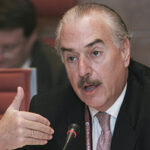Member Pastrana also discussed the importance of building a shared society with political representatives of the Guatemalan Congress including its Speaker H.E. Pedro Muadi Menéndez. In this context the Delegation was invited by the Parliament Indigenous People Commission to present the Shared Societies and the Intercultural Cities Project in an Extraordinary Session when the Club de Madrid contributions for the defense of the rights of indigenous people all around the world.
Created with Admarket’s flickrSLiDR.
The Shared Societies Project has played a significant role at national and international levels in shaping the discourse on overcoming social exclusion and building Shared Societies. But the reality is that most activities to build shared societies takes place at the local level. As stated in the original project materials: “the well-being of individuals and communities leads to the well-being of the nation, and among nations.”
The comparative advantage of the Club de Madrid is most clearly seen at the national and international level because the Members have functioned as national and international leaders and they continue to have access and convening power with current national and international leaders. But many Members have also been local officials during their career, serving in local authorities, trade unions, non-governmental organisations and activist movements. Therefore they are interested and available to work at the local level. Being this the case of Pres. Pastrana who, in 1988, was elected the first Popular Mayor of Bogotá.
Shared Societies are achieved when all parts of a community value and feel committed to their shared achievements. The most effective way is through a partnership between the state and political leaders, civil society, religious institutions and the private sector.
The Project has argued that leaders have a responsibility to create the enabling conditions in which good relations can flourish within diverse societies and has worked in places as diverse as Kyrgyzstan and South Africa to help national and local leaders to identify what that means in practice. Now is the moment to work in Guatemala, and in partnership with its capital, as well as with the Club de Madrid Partners from the Council of Europe, the Intercultural Cities Program.
